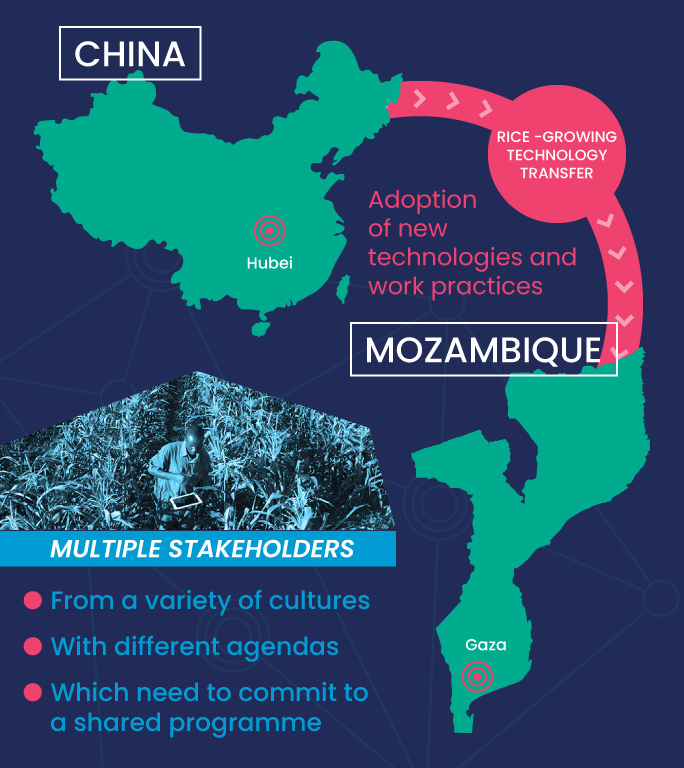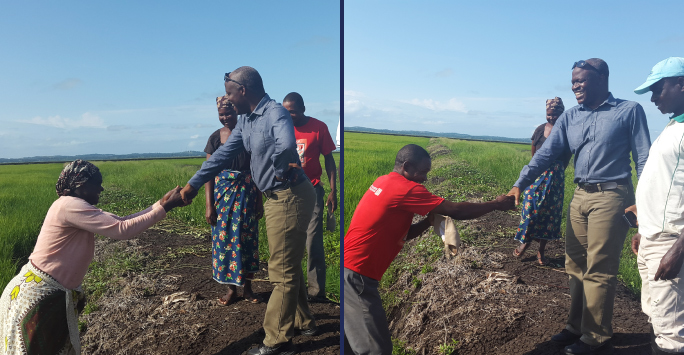
How can the coordination on interdependent activities can be achieved in technology transfer programmes consisting of multiple stakeholders? DBA alumni Dr Armando Ussivane provided answers to this question.
Research by alumni Executive DBA alumni Dr Armando Ussivane addressed issues associated with stakeholder coordination and collaboration within a complex international technology transfer project.
Lead with confidence and transform your business with our Executive DBA
Following a participatory action research approach, Armando analysed the barriers to successful performance during the process of implementing new rice-growing Chinese technology in Mozambique.
By giving voice to all the main actors involved, Armando gained a further understanding of the programme’s complexity and developed practical solutions to coordinate the technology transfer activities of independent stakeholders.
As a result, the programme successfully triplicated rice production, from less than 2.5 to 6-9 tonnes per hectare.
Context
Dr Armando Ussivane is the CEO of Regadio Do Baixo Limpopo (RBL), a Mozambique Government Agency responsible for the water management system of The Baixo Limpopo Irrigation and Climate Resilience Project (BLICRP), a large poverty alleviation and food security programme.
RBL input focused on adding value to agricultural activities (i.e. rice and horticulture) by providing a climate resistant irrigation infrastructure which allowed farmers to grow food in dry periods, while keeping excess water from damaging vulnerable crops during floods.
This involved the transfer of rice-growing technology from China to the to the fields of Mozambique, in a joint project with a private agricultural enterprise which had successfully increased the production of quality rice in Hubei, China.
In practice, the project consisted in implementing an irrigation system driven by a self-powered pumping station in the Xai-Xai District (Gaza Province) able to run normally if the national power grid failed.
The project was expected to benefit approximately 8,000 small-scale famers, many of them women who were learning how to move from subsistence agriculture to becoming “emerging commercial farmers”.
Research Issue
BLICRP’s activities involved transfer of high and low-technologies as well as the adoption of new work practices.
Successful management of the program required the co-ordination of a wide variety of stakeholders including government and local public agencies, local and international farmers, NGOs, banks and private firms with different national cultures and agendas.

Organisational issues hindering success arose in the early months of the programme, as efforts to foster cooperation were met by apparently intractable differences in the identities, interests and expectations of independent stakeholders.
Research Approach
The aim of Armando’s EDBA thesis research was to explain the barriers to technology transfer and develop strategies to resolve them.
Participatory action research gives voice to otherwise marginalised perspectives and encourages people with different ideas and mindsets to work together to generate insights that lead to organisational solutions.
What is participatory action research?
Participatory action research is a methodology in which researchers and participants work together to understand a problem and find solutions.
Following an initial stage of insight gathering via personal interviews, Armando set up a participatory action research group with representatives of all major stakeholders.
During several sessions, suggestions, inferences and assumptions were critiqued and tested within the context of a public forum which allowed for equal stakeholder participation.
The goal was to produce an action plan to improve the management, implementation and evaluation ofthe programme.

Dr Armando Ussivane meting farmers from The Baixo Limpopo Irrigation and Climate Resilience Project.
Research Results
Participatory action research sessions highlighted tensions and conflicts within the programme rooted in differences in meanings, behaviours, attitudes or values.
As a result of a process of cooperative inquiry, four categories of boundary hindering performance were identified and participant discussions were translated into actionable organisational solutions.
| Boundary | Organisational Problem | Organisational solution |
|---|---|---|
| Property rights boundary (intellectual vs land) |
The local community demanded access to the programme’s developed farms as compensation for the reduction of land caused by the BLICRP. This represented a cost increase in training of local farmers and potential production loses for private investors during the training period. |
RBL and Chinese private investor co-financed costs for training of local farmers. Large farming plots in developed areas were gradually allocated to local farmers following successful completion of the training programme. |
| Tensions between public policy and private business | Long-term oriented agricultural research goals (i.e. finding more weather adaptable rice varieties) conflicted with farmers more immediate needs (i.e. improving the management of the irrigation infrastructure). | Changes in the research agenda were implemented by the Chinese investor and RBL, including the establishment of a research unit aimed at addressing immediate and practical problems within the programme. |
| Tensions between participants inside the programme and agricultural firms outside it |
Local farmers demanded more independence form Chinese suppliers, including being able to use local service providers and fertilisers. There were also conflicts between national and local interests (i.e. farmers wanted to break the rules of the business model to optimise their income). |
Local farmers and Chinese modified and adapted part of their existing knowledge to suit the context of the programme. As part of the joint problems-ring approach, farmers were allowed to use alternative service providers, and alternative suppliers of fertiliser, in exchange of joint management of key pumping stations. |
| Tensions between partner in aid and private investor (collaborator or competitor) |
Four developed farms had been allocated to Chinese State farms with the responsibility of providing farming services and technical assistance to local farmers. The Chinese investor was responsible from buying farmer’s rice and controlling the rice processing facilities. The conflicting nature of their roles (i.e. knowledge transfer facilitators and farming business) raised concerns among local farmers. |
The Chinese investor, Chinese teams and RBL were recommended by the participatory group to undertake segregation of their roles. The role of knowledge transfer was separated from that of service provider and farmer’s buyer. |
Research Impact
From an economic perspective, the change in the technology transfer model within the food security programme succeeded in increasing productivity of rice growing in the area, which resulted in an increase from less than 2.5 to 6-9 tonnes per hectare.
Cooperative inquiry with stakeholders enabled by participatory action research, allowed programme actors to reach an understanding of the barriers experienced by others and find mutually satisfactory solutions.
As Armando explained “the technology transfer process works by turning the very differences between stakeholders into a resource for problem-solving, rather than viewing those differences as a barrier to be compromised through negotiation”.
The participatory action research process:
- Helped participants to clarify the issues and challenges facing them
- Created awareness of the need for action
- Focused attention on specific areas of concern
- Identified resources and strategies for change
- Helped to assess the impact of those strategies
As well as creating a new thinking space for mutual problem solving, the action research group became a powerful tool for people empowerment.
By increasing participants’ control over their own situations, local farmers were not simply the recipients of aid, but were able to contribute to the way in which the programme was enacted.
The cooperative inquiry process was judged effective by all actors involved and as a result, participatory action research sessions continued programme after the formal research study had finished.
The value of this collaborative approach to problem solving was also recognised by the Bank of Mozambique, which commissioned an independent comparative study of two food security programmes within the country.
 |
Dr Armando Ussivane Regadio Do Baixo Limpop CEO |
|
You can find out more about Armando's research here: Ussivane, A. M. and Ellwood, P. (2019). 'Using Action Research to Organize Technology Transfer in Complex Innovation Contexts', Technology Innovation Management Review, 9(4):17–26.
Ussivane, A. M. and Ellwood, P. (2020). 'Action learning in the service of food security and poverty alleviation in Mozambique', Action Learning: Research and Practice, 17(1):100-107.
|